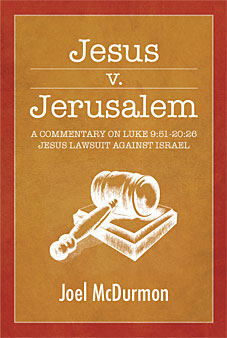Cessation
or His God, is God
When it comes to the miraculous spiritual gifts, I’m a bit of a hybrid.
When it comes to the miraculous spiritual gifts, I’m a bit of a hybrid.
A Commentary on Luke 9:51-20:26
Jesus’ Lawsuit Against Israel
 .
.
I haven’t read this, but it sounds like an eye-opener for those new to preterism. Perhaps this approach will be helpful in getting Christians used to thinking more contextually about the New Testament:
“Most people don’t realize that many if not most of Jesus’ parables were intended not as general morality tales, but as particular pronouncements of coming judgment and change. Jesus was warning Jerusalem to repent and to accept its new King (Jesus) or else fall under ultimate condemnation of God.
An analysis of the literary structure of Day 5 of Creation and passages that are apparently parallel.
Continue reading
“And the times of this ignorance God winked at;
but now commandeth all men every where to repent…” Acts 17:30
Reading the Bible without an understanding of Creational and Covenant structures is like watching test cricket without knowing the rules. It’s not unusual for even the best commentators to be distracted by something as inconsequential as a lost seagull. But every moment is part of a bigger picture. Isaiah can seem tedious at times, but it’s a long game. Let’s look at Isaiah 4:2-6, which relates the purging of exiled Israel to the jealous inspection in Numbers 5. In this case, she comes up trumps.
Jesus’ reference to sun, moon and stars in Matthew 24 has nothing to do with the physical world, and everything to do with the microcosmic world of the Temple. Because of this, the Covenant Creationists think Genesis 1 is only about the Covenant with Adam, not about physical creation. They’re wrong, just as the literalists are wrong about Matthew 24 predicting the end of the world.
Joel McDurmon has an excellent rundown on the first century context of Jesus’ parables:
…The separation of wheat and tares, then, pertained to the destruction of Jerusalem and the separation of God’s true fruit-bearing people from the weeds, the unbelieving Jews of that time. Ironically, this interpretation gets to the heart of the picture in the parable.

“And after my skin is destroyed, this I know, that in my flesh I shall see God.” Job 19:26
Full preterism leads logically to gnosticism. If death is already defeated, salvation has come to the world, and all is now perfect, then of necessity all three — death, salvation and perfection — have to be redefined. They are only Covenantal, “spiritual.” You can probably understand why doctrines like these don’t originate from the persecuted church. Some hope.
However, that said, I agree with 97.3963798475% of full preterism. Their take on the parousia texts is logical and contextual. Jesus actually did come back soon, as He promised, to rescue the persecuted firstfruits church. The textual ping-pong of the well-meaning partial preterists (who can’t agree between themselves on which parousia texts refer to the end of history) is a confusion of which our God could not possibly be the author. So what’s the answer?
“Beware of dogs, beware of evil workers, beware of the mutilation!”
Philippians 3:2 (NKJV)
Jeff Meyers copped flak for his take on the parable of the Pharisee and the tax collector. He says the tax collector was justified for his Covenant faithfulness, and the Pharisee was not. Was it not the Pharisee who was faithful? And, either way, is this not justification by works? Has Jeff got night and day around the wrong way?